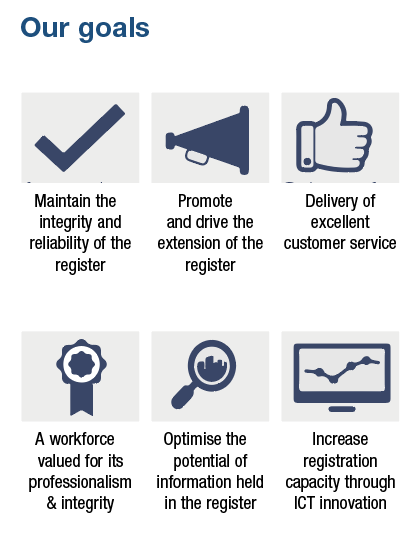
A state-led approach to housing
17th May 2019
Vienna: Europe’s city of Social Housing
17th May 2019Towards a fully electronic property registration system

Liz Pope, PRA CEO.
As the Property Registration Authority implements its Statement of Strategy 2019-2021, Liz Pope, CEO, looks back on the long and proud history of protecting and recording property rights and transactions in Ireland, and looks forward to the future of title registration.
The Property Registration Authority (PRA) was established in 2006 to manage the Land Registry, Registry of Deeds and operate the Ground Rents Scheme. It has a mandate to promote and extend registration of title in Ireland, and currently 93 per cent of the land mass is registered on the land register. When a property is purchased, it is compulsory to register the title to it on the Land Register.
The database held by the PRA comprises some 2.26 million titles (data on legal ownership) and is the single authoritative source for ownership of legal rights on or over land. Registration carries with it a State guarantee, which allows those who access it to transact on the register with certainty and security.
The PRA offers a range of services electronically, both for access to property information and electronic registration. The Land Register is fully computerised and all registered land parcels are digitised and available to view on Landdirect.ie. Visitors to the site can quickly and easily locate a property using intuitive map based screens and on payment of a small fee, obtain information on ownership, mortgages or rights of way affecting that property or, indeed, any registered property in the State. In addition, certified proof of ownership, which is guaranteed by the State, can be ordered and paid for online.
|
HERITAGE EVENTS AT THE REGISTRY OF DEEDS The Registry of Deeds, now one of the oldest continuously operating public service organisations in the State, comprises a significant and globally unique repository of property transaction records dating back to 1708. The type of deeds recorded include deeds of conveyance, leases, mortgages, wills and marriage settlements. We are developing a program of events (including lectures, tours, seminars) to support people to access our collections and to increase public engagement and enjoyment of the historical treasures we hold. If you would like to be notified about upcoming events and heritage developments, please contact us at heritage@prai.ie to be added to our mailing list. Since 1831, Registry of Deeds has been housed in the landmark James Gandon designed building at the top of Henrietta Street alongside Kings Inn. T: 353 0761 001610 • W: www.prai.ie/registry-of-deeds-services/ • E: heritage@prai.ie Twitter: @PRA_Ireland |
Why do we have Title Registration in Ireland?
The Registry of Deeds was originally established as far back as 1707. Its main function was to combat fraud and forgeries in land transactions by establishing a system for determining priority between documents relating to the same piece of land. The Land Registry was established in 1891, effectively to register the transfer of land ownership from landlords to tenant farmers. The principal objective of the land registration system was to confer legal certainty for those purchasing their holdings and security for repayment of monies advanced out of public funds to tenant farmers. As a direct consequence, most agricultural land is now registered.
The Irish property registration system has, of course, transformed since its inception in the historical context of the 19th Century. However, the same basic principles of legal certainty and security underpinned by a state guarantee apply, which enables property market transactions to take place with confidence in the integrity of the register. Many common law jurisdictions such as Australia, Canada and the UK operate a guaranteed title registration system, similar to Irish system.
The Land Registry system is easier to transact with and is more efficient and less costly than transacting in a deeds based system. So, put simply, buyers and lenders can rely on the data and are afforded certainty that registered legal rights are protected on the Land Register. The Registration of Title Act, 1964 expanded on that principle, with the introduction of compulsory registration. The Registration of Deeds and Titles Act, 2006 established the Authority and under its statutory remit, we have significantly extended compulsory registration across all counties between 2006 and 2011. However, a considerable amount of titles in urban areas remain unregistered. Extending registration over those areas remains a key goal in our current strategy.
What is the Benefit of Title Registration?
The World Bank has long recognised the value of an efficient title registration system, both for economies by supporting investment, productivity and growth, and for individuals, who are unable to raise capital or enforce rights in or over land, in the absence of proof of ownership of those rights. Therefore, a Land Registry acts as an enabling institution emblematic of a free democratic society.
However, the benefits of title registration go beyond safeguarding individual property rights. Governments can rely on title data for evidence based decision making in relation to spatial planning and providing infrastructure where it is most needed. Accessibility and optimisation of data is critical to support data driven policy and PRA services are proving invaluable to many public sector bodies in carrying out their statutory functions. As custodians of valuable spatial data, we can provide effective bespoke spatial solutions for our customers. The work of our Spatial Information Unit received an award in the category of Excellence through Collaboration at the Civil Service Excellence and Innovation Awards for its ‘Digital First’ solution in December 2016 in respect of the transfer of water assets from local authorities to Irish Water.

Pictured Liz Pope, PRA CEO; John Paul Phelan TD, Minister of State for Local Government and Electoral Reform; and John Coleman, PRA Chairperson, at the launch of the Statement of Strategy 2019-2021 and the introduction of the PRA’s new Property Alert Service in November 2018.
Property Alert Service
As part of its Counter Fraud Framework the PRA monitors trends in property fraud. Property is usually the most valuable asset people own. It can be sold and mortgaged to raise money and can, therefore, be an attractive target for fraudsters. This new service aims to help deter and detect potential property fraud. It is a free, online service available to the public that allows property owners to monitor registered properties for possible fraudulent activity. Users of the service will receive email and/or text alerts when an application has been lodged with the PRA to update the Land Register. While the new alert service will not prevent fraud from happening, it provides an early warning system which allows owners to take appropriate action, should they suspect fraudulent activity has happened with their property. In order to avail of the service, the property must be registered on the land register. It is of course of utmost importance that registered owners keep their details up to date to safeguard their rights.
Vision and mission
The PRA Statement of Strategy outlines our vision for a secure and fully electronic property registration system contributing to economic and social development.
Our mission, “safeguarding property rights and transactions in Ireland” reflects the continuance of our enduring legacy of protecting registered property rights into the future. No matter what the process of registration is, whether paper based or digital, the integrity of the register will remain the guiding principle of title registration. Integrity as a core value will also remain at the heart of service delivery by the PRA.
Our values
Our values strongly reflect the views of our staff, following consultation, and also mirror those in Our Public Service 2020, the overall strategy for development and innovation in the public service. Those values are Integrity, Accountability, Innovation, Professionalism, Staff Development.
What does the future hold?
The digital register provides a secure online database which is constantly updated as transactions in the property market are registered. We  currently provide eRegistration services for processing releases of mortgages and Charging Orders under the Nursing Home Support Scheme. Otherwise, applications to update the register are based on original documents of title which are paper based. We look forward to developing our electronic platforms, Landdirect.ie and eRegistration.ie, to further digitise the registration process in line with our Statement of Strategy.
currently provide eRegistration services for processing releases of mortgages and Charging Orders under the Nursing Home Support Scheme. Otherwise, applications to update the register are based on original documents of title which are paper based. We look forward to developing our electronic platforms, Landdirect.ie and eRegistration.ie, to further digitise the registration process in line with our Statement of Strategy.
The PRA, together with the Valuation Office and Ordnance Survey Ireland, is now under the remit of the Department of Housing Planning and Local Government which has responsibility for merging the three organisations into Tailte Éireann. The new organisation will provide the opportunity to optimise business processes and systems to enhance the combined public value of the services provided and align with the National Data Infrastructure, the Public Service Data Strategy and related governance and legislation and international geospatial information management. Progress towards the merger is ongoing and we continue to work with our merger partners and departmental colleagues in developing the necessary infrastructure to establish Tailte Éireann.
T: +353 0761 001610
W: www.prai.ie
E: info@prai.ie, heritage@prai.ie
Twitter: @PRA_Ireland









